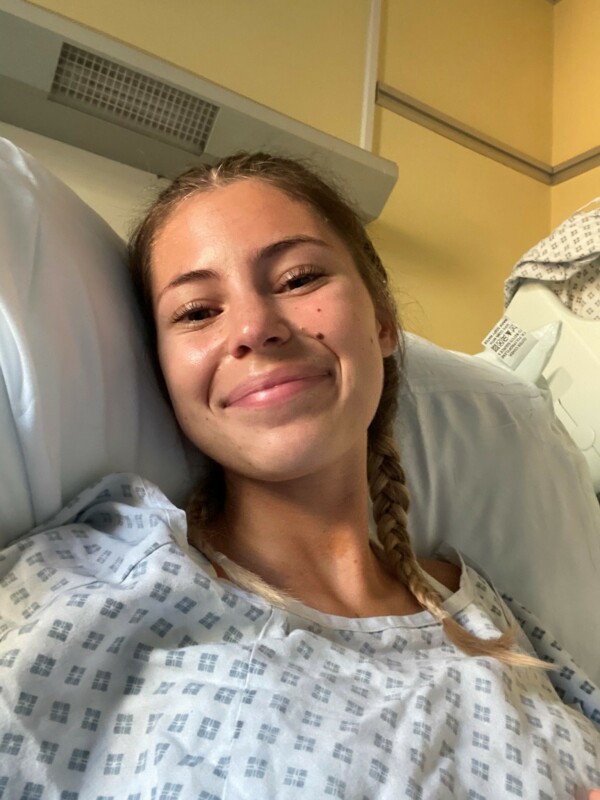New study uncovers potential way to prevent breast cancer in pre-menopausal women
A new study funded by Breast Cancer Now and supported by Prevent Breast Cancer, reveals a drug approved for use in other conditions could be repurposed to prevent breast cancer in women before the menopause.
Researchers at the Manchester Breast Centre, based at The University of Manchester, found that blocking the effects of the hormone progesterone, using ulipristal acetate, a drug already used on the NHS, may reduce the risk of breast cancer developing in women before the menopause, with a strong family history of the disease.
The study, published today in the journal Nature, found that taking ulipristal acetate helped block the growth of breast cells that can turn into cancer, called luminal progenitors. These cells are the starting point for triple negative breast cancer, a more aggressive form of the disease that is more common in younger women and black women. Previous research has shown that the risk of triple negative breast cancer coming back or spreading in the first few years after diagnosis, is higher than in other types of breast cancer.
Several of the study authors were supported by the National Institute for Health and Care Research (NIHR) Manchester Biomedical Research Centre (BRC) as part of its Cancer Prevention and Early Detection Theme, including Sub-Theme Lead Dr Sacha Howell, and key researchers Dr Bruno Simões, Professor Gareth Evans and Professor Sue Astley.
Additional funding was provided by Prevent Breast Cancer, who are based at The Nightingale Centre – Europe’s first purpose-built breast cancer prevention centre which is situated at Wythenshawe Hospital, part of Manchester University NHS Foundation Trust (MFT).
We are profoundly grateful to the women who volunteered for this study. Our research, with them, provides evidence that progesterone plays a critical role in breast cancer development in high-risk individuals. By targeting its action, ulipristal acetate and other anti-progestins show promise as preventive treatments for women at increased risk.
Dr Sacha Howell, Clinical lead author and Sub-Theme Lead in Manchester BRC’s Cancer Prevention and Early Detection Theme
Progesterone is a hormone that can drive breast cancer development. It promotes the growth of a type of breast cell, that has the potential to turn into breast cancer. It can also influence the environment inside the breast, making it easier for these healthy cells to transform into cancer cells. Blocking these effects of progesterone could be a new way to stop breast cancer before it starts.
Between 2016 and 2019, 24 women aged 34-44 with a family history of breast cancer took ulipristal acetate for a 12-week period. During the trial, they underwent breast biopsies, blood tests, and detailed Magnetic Resonance Imaging (MRI) scans before and after treatment.
The researchers were measuring changes in breast tissue to understand if the drug might have a protective effect against breast cancer development.
MRI scans showed that the breast tissue became less dense with treatment, which is important because higher breast density is known to increase risk of breast cancer. The team found that the treatment worked best in women who had high breast density before treatment started.
Researchers also observed dramatic changes in breast tissue. They found that treatment significantly reduced the number and function of certain collagen proteins that normally help support breast tissue. Overall, the breast tissue became less stiff, making the environment less favourable for cancers to develop and grow.
One protein in particular – collagen 6 – showed the most noticeable decrease after treatment. Based on their findings, researchers now think that it may directly influence the behaviour of luminal progenitor cells, that can give rise to breast cancer.
All these changes suggest that the drug alters breast tissue in a way that makes it harder for cancer cells to develop and grow, therefore reducing the risk of breast cancer.
Clinical lead author, Dr Sacha Howell (pictured right), Clinical senior lecturer at The University of Manchester, Director of Manchester Breast Centre and Consultant Oncologist at The Christie and MFT said: “We are profoundly grateful to the women who volunteered for this study. Our research, with them, provides evidence that progesterone plays a critical role in breast cancer development in high-risk individuals. By targeting its action, ulipristal acetate and other anti-progestins show promise as preventive treatments for women at increased risk.
“What makes this study particularly exciting is the combination of clinical imaging and biological analysis, which gives us a powerful tool to understand how prevention therapies work at both the tissue and molecular levels. These results lay important groundwork for larger trials to confirm the potential of anti-progestins in reducing breast cancer risk”.


Laboratory lead author, Dr Bruno Simões (pictured left), research fellow at The University of Manchester, Principal Investigator at the Manchester Breast Centre said: “Our team was intrigued by how anti-progestins reshaped the breast tissue environment at the molecular level, reducing the number of tumour-initiating cells. We observed clear reductions in collagen levels and organisation, giving us direct insight into how targeting progesterone signalling can create conditions that make it harder for cancers to develop.”
“Our goal is to understand the biology underlying breast cancer risk factors so we can develop better strategies to reduce the number of women affected by the disease. This study is particularly exciting because it suggests that women with increased breast density, a well-established risk factor, may benefit most from preventive treatment with an anti-progestin drug.”
Grace Burton (pictured right), 27, from Bromley, Greater London, underwent a preventative double mastectomy last year after finding out she was at high risk of breast cancer due to an inherited BRCA1 gene change at the age of 21.
Grace says: “Breast cancer has had a huge impact on my family – both my mum and my aunt were diagnosed, and knowing I was at high risk was always in the back of my mind. Having later gone through preventative surgery myself, I know how heavy and difficult those decisions can feel. That’s why this new research into preventative medication is so exciting, it offers hope for other women who might one day have less invasive options to protect their health.
“For those of us with a strong family history, the possibility of preventing breast cancer before it starts is incredible. It gives me hope that future generations may not have to make the same tough choices and can grow up with more options and less fear around breast cancer.”
